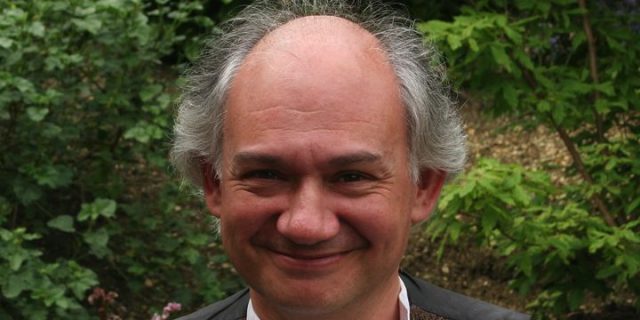Andy Gosler is an ornithologist at Oxford University who specialises in bird ecology and ethno-ornithology (how people relate to birds). He is a christian, but didn’t start out life with any belief. An adult convert, it was, strangely, evolution and wildlife conservation that led him to faith.
Here is how that happened.
A natural history
Some people seem to develop their life interests very early, and that’s how it was for Andy. Growing up in London, he was always interested in natural history, and when he was ten his interest began to particularly focus on birds. He began bird-watching in local parks and woods, and to haunt the Natural History Museum.
His parents were secular Jewish, which meant he learnt Jewish history and culture, and participated in some traditions, but little more. His father was an atheist, partly because of the bigotry and hypocrisy he saw in religion, but his mother seemed to have some experience of God. And so he grew up with limited interaction with christianity (Christmas and morning prayers at school), but encouraged to be a free thinker.
Natural history values
His visits to the Natural History Museum taught him about evolution and ecology, and the “shrine-like monuments to Darwin, Huxley and Owen”, the heroes of evolution, helped develop in him a sense of spirituality in nature. He had been taught that Genesis was not to be taken literally, so saw no barriers between science and spirituality. And so science and spirituality became entwined, and if he found the divine anywhere in life, it was in biology. But regarding God, he saw himself as an agnostic.
Every species is precious
Andy came to regard each bird species as “precious, uniquely evolved, irreplaceable and therefore of inestimable value”, which led him to the view that humans were the most destructive species, being the cause of almost all extinctions.
Studying ecology at university expanded his view to see the holistic nature of the natural world, and so he came to value all forms of life. But a philosophical issue began to intrude in to his thinking.
He saw great value in life, especially birdlife, but then began to wonder what gave any life value, including human life. He read biologist Richard Dawkins’ book, The Selfish Gene, which argued that nothing had value from an evolutionary viewpoint, and that ecological value was merely a human construct.
As a committed conservationist by this time, this didn’t sit well with him, for he believed life really was amazing and wonderful. He felt that Dawkins’ conclusion, that our valuing of nature was simply a result of our genes, was deeply mistaken – “I could not help feeling that any biologist who argues that life has no value has lost the plot.”
So he decided that perhaps Dawkins hadn’t considered all the facts.
Oxford, atheism and God
He went to Oxford to do his PhD in ornithology, and found that few of the biologists he met there were committed to the value of life as he was, but took a view similar to the atheist Dawkins. He had absorbed an atheistic view from his biology study, but felt the arguments for it were weak.
His reading led him to the conclusion that many of the atheistic arguments he had encountered attacked “straw men” such as a literal reading of Genesis, which he had never thought realistic. And so he decided to do more reading on the interface between science, philosophy and faith.
The ethics of biological conservation
He was reading extensively in biological conservation, and found that many conservationists argued, contrary to Dawkins and company, that life had intrinsic value, even though they offered no basis for this belief. No-one else seemed to question this inconsistency, but he found it impossible to ignore.
He read more, and eventually he came to the view that the theists were right after all. Life did indeed have intrinsic value, it was a true ethical conclusion that we should value it, and that ethic pointed to the existence of God (a sort of ecological version of the Moral argument).
Jesus was like his atheist dad?
The final step in his journey was when he found an old Bible among his books, and decided to read the New Testament. And he came to the surprising conclusion that the Jesus he found there sounded like his father: “hot on the issues of religious bigotry and hypocrisy, and not at all what I’d been led by the atheists to expect.”
He re-evaluated his life, career, relationships, and decided that rather than the “blind pitiless indifference” that Richard Dawkins saw, love was the core of all that he did and knew. And he observed that as he started to ponder God’s existence, coincidences began to happen that led him in the direction of belief. He says: “I had forty two years in which to assess the ‘background rate’ of coincidence in my life”, so, in information terms, he decided these coincidences were information and not noise.
The following year he was baptised as a christian, and his parents attended the baptismal service.
Life goes on
Andy has continued to work for wildlife conservation, through his work at Oxford University, several scientific associations and international conservation groups, and through various volunteer groups, including the christian environmental group A Rocha.
Read more about Andy Gosler’s story in True Scientists, True Faith, and about his work at Oxford University.
Picture: Holy Trinity Church, Oxford.
